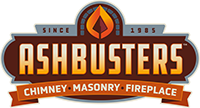Chimney & Fireplace Frequently Asked Questions
Q: Does it really matter if I have my chimney cleaned?
A: You may think that chimney cleanings (sweepings) aren’t all that important, but they are! Every time you have a fire in your fireplace, highly combustible (i.e. flammable) byproducts are created. These byproducts settle on the flue liner, where they can easily ignite and cause a chimney fire. It only takes minutes for a chimney fire to destroy a clay or metal liner and spread to other areas of the home… So yes, chimney cleanings do matter!
Q: When do I need to have my chimney cleaned?
A: The general rule of thumb is that you should have your chimney cleaned when soot deposits (creosote) reach a thickness of a quarter of an inch, or when you spot glazed creosote anywhere in your chimney or fireplace. This isn’t just our rule of thumb, it’s the Chimney Safety Institute of America’s (CSIA) and the National Fire Protection Association’s (NFPA) rule of thumb!
Both organizations also recommend that you schedule an annual chimney inspection with a certified professional, so you’ll know about any buildup or blockages, as well as any repairs that may be needed before you use your fireplace again.
The NFPA standard 211 (the Bible for chimney and venting professionals) says: “Chimneys, fireplaces, and vents shall be inspected at least once a year for soundness, freedom from deposits, and correct clearances. Cleaning, maintenance, and repairs shall be done if necessary.”
Q: What if I don’t use my fireplace? Do I still need to have it inspected every year?
A: Even chimneys and fireplaces that aren’t used regularly (or at all) can undergo damage. Chimney leaks, flue blockages, and masonry decay can ruin a chimney as well as the surrounding framing, attic walls, and drywall, if not addressed. So, even if you don’t use your chimney, scheduling routine inspections can help protect your home against damage, maintain your property’s value, and keep costly repairs and rebuilds at bay.
Q: What could be causing my smoky fireplace problems?
A: Myth-busting time: smoky fireplaces aren’t normal. Typically, if you have a smoke problem, it’s because:
- You have a bird nest, animal, or other blockage in your flue.
- You forgot to open the damper.
- Your flue is too small for your fireplace.
- Your chimney isn’t tall enough to achieve proper draft.
The solution to the first problem is to schedule an inspection and chimney cleaning. The solution to the second is to check to make sure your damper is opened. The solution to the third is to have a smoke guard or chimney fan installed. And the solution to the fourth problem is to have your chimney extended.
Q: Why does my fireplace stink so bad?
A: If you have a stinky fireplace, chances are one of two things is going on:
- You have creosote buildup in your chimney. Creosote can get really smelly, especially during the warmer months when the humidity is high.
- You have an animal in your chimney. Animals can get into uncapped chimneys and build nests inside. Unfortunately, many don’t make it out, which can lead to some pretty awful smells coming from your chimney.
If chimney odor is driving you out of your favorite room, schedule an inspection and chimney cleaning. A chimney professional will check for leaks, animals, nesting materials, and creosote buildup, and remove anything that shouldn’t be in your chimney.
If the odor doesn’t go away with a good cleaning, you may also need to use a chimney deodorant or something like kitty litter or baking soda to help with odor control.
Q: What should I do in the event of a chimney fire?
A: If you ever have a chimney fire in your home, go outside immediately and call the fire department. Chimney fires can spread to other areas of the home rapidly, so act fast and get yourself and your family to safety.After the fire is put out and the firefighters have cleared the home for re-entry, call a certified chimney professional to schedule an inspection and cleaning. A chimney pro will alert you to any damage caused by the fire and let you know whether or not the system is safe for use. If it’s not, they’ll let you know what needs to be done in terms of repairs and restoration.
Never use your chimney after a chimney fire without getting the OK from a certified chimney professional!
Q: What are chimney swifts, and what do I do if I have one in my chimney?
A: A chimney swift is a migratory bird that loves to spend the summer and early fall nesting in chimneys. These birds are federally protected, so if you do have a chimney swift in your chimney, by law you’re required to wait for them to leave on their own before doing anything with your chimney and fireplace.
Once the birds migrate south for the winter, you’ll want to call a certified chimney professional to have the chimney cleaned and arrange for a good chimney cap to be installed atop your chimney. A cap with an animal/bird screen will work to keep the chimney swifts from returning the following year.
Any Other Questions?
Have any other questions we didn’t answer here? Feel free to reach out to us. We’re happy to help!
One of the main things our customers love about us is our team of dedicatedand competent technicians.
